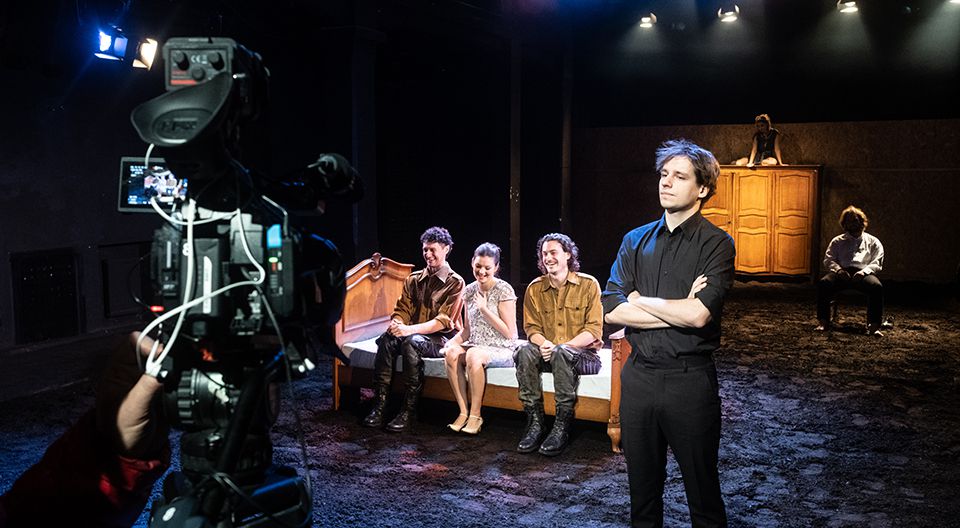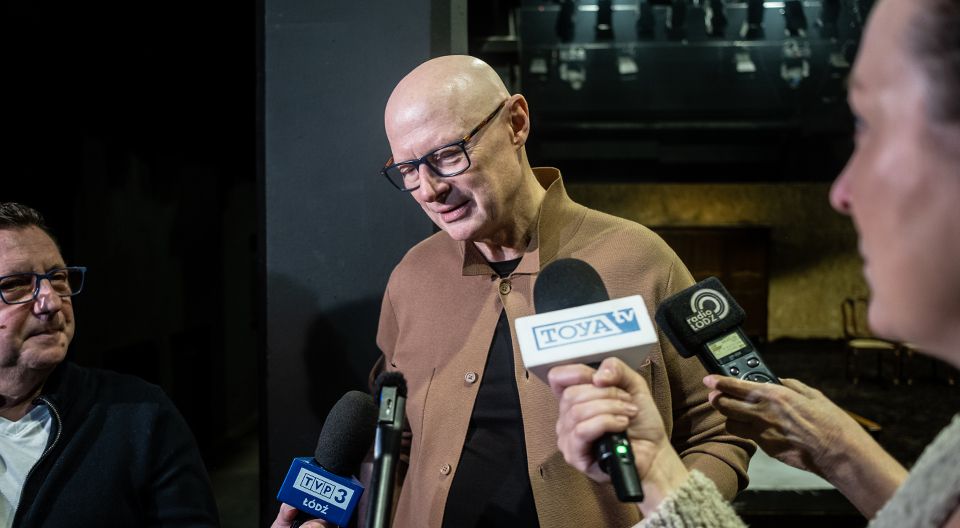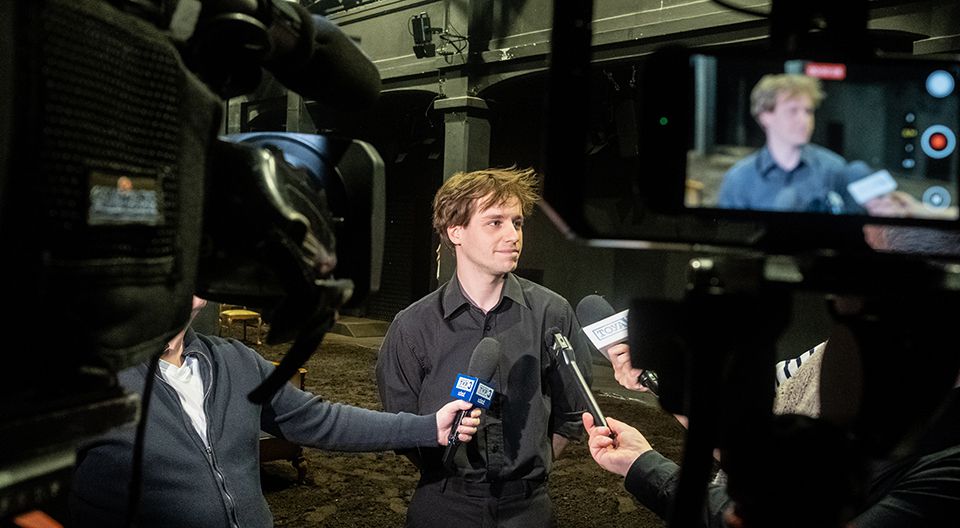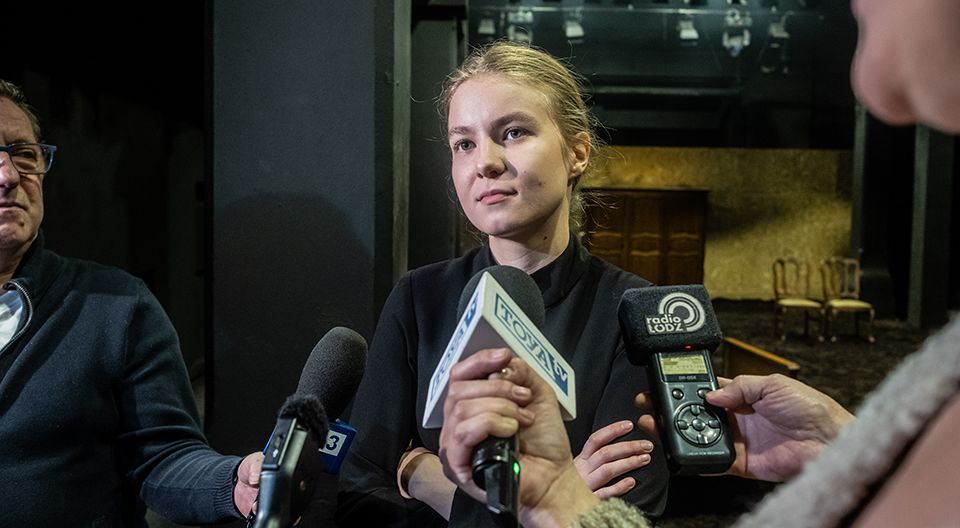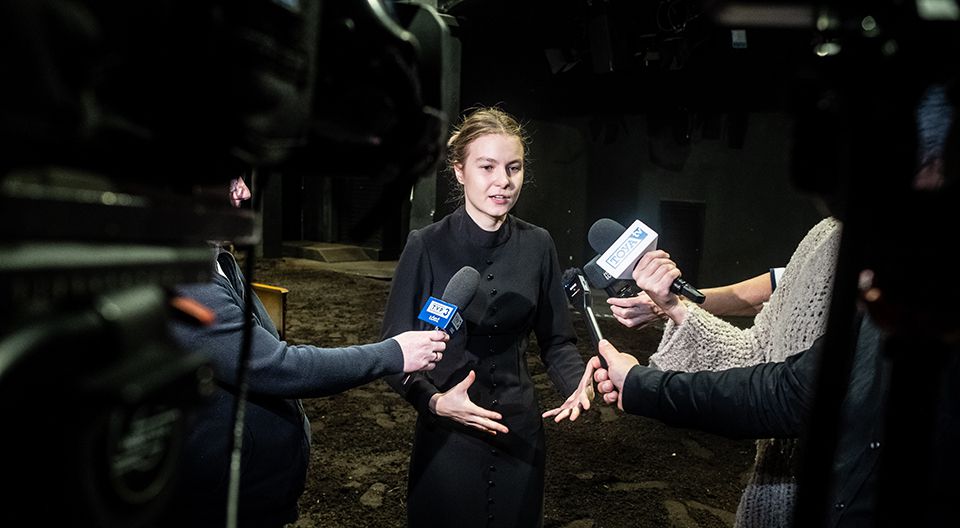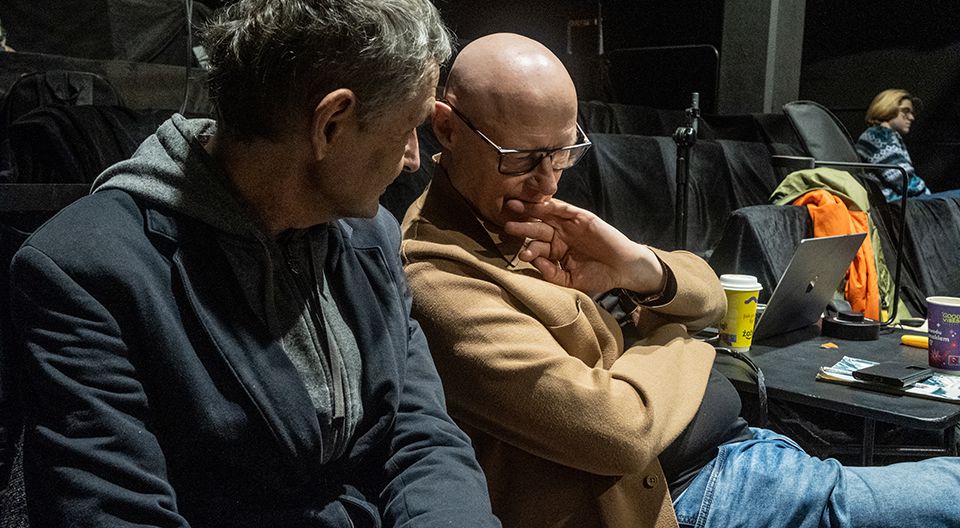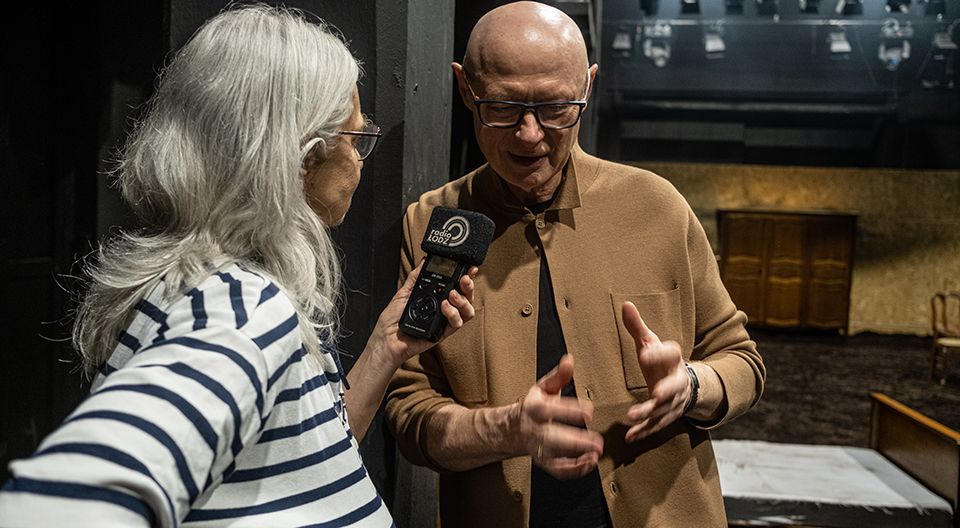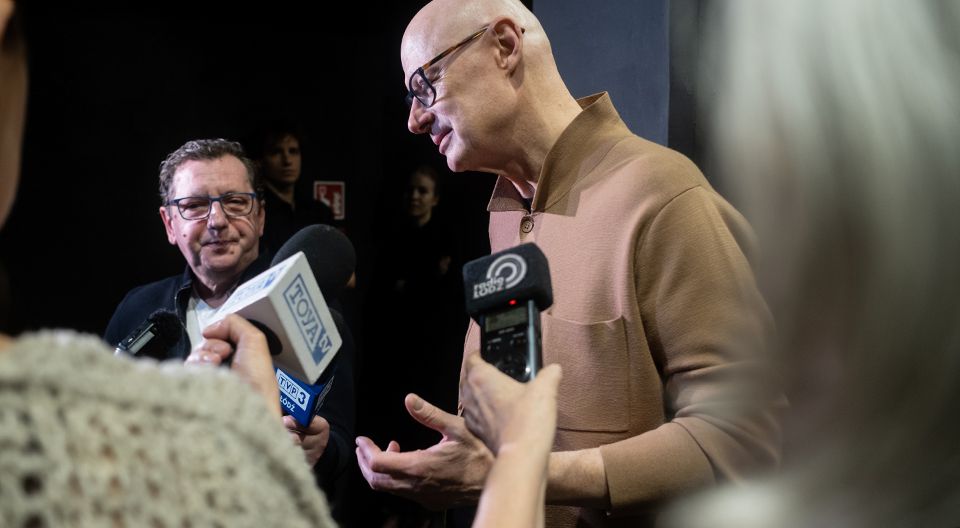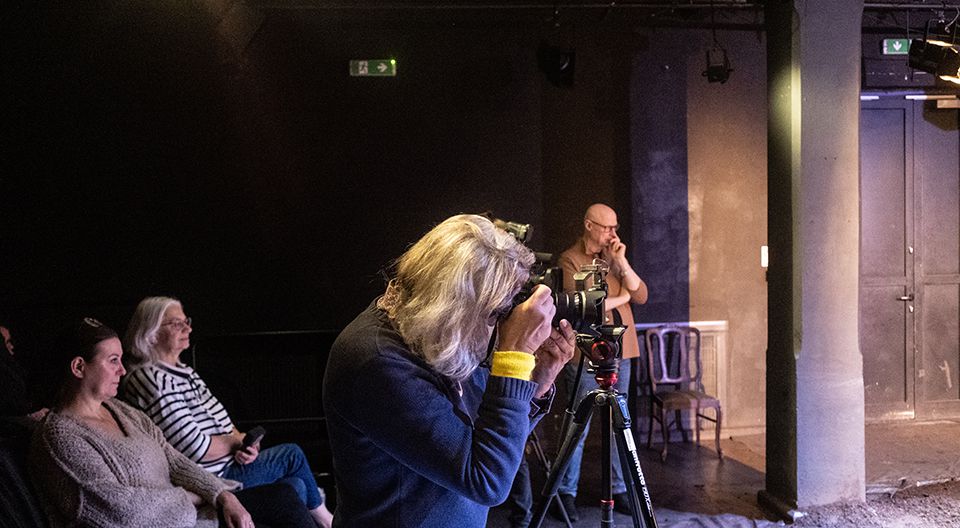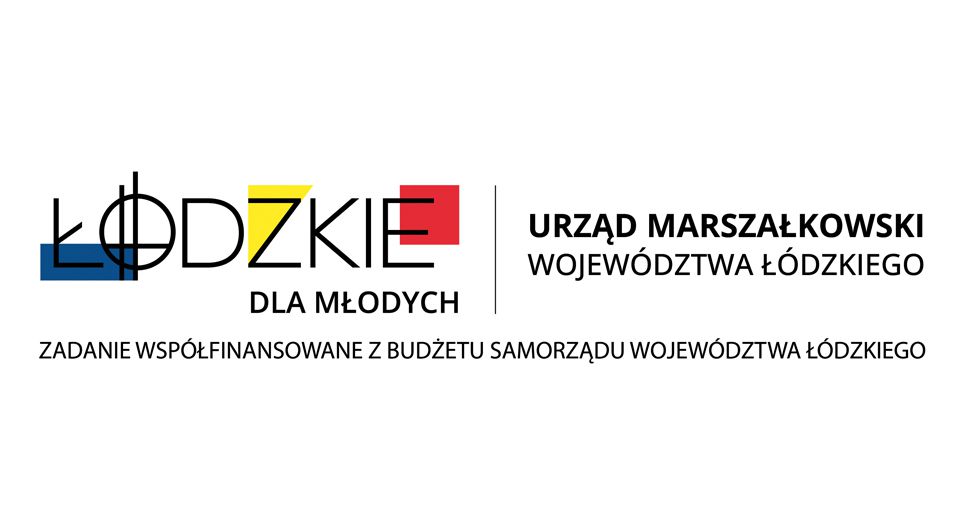09.
10.
2025.
Department
Acting
Acting
About a text which remains relevant today. About actors who treat their roles with understanding. About a play which speaks about the present. Adam Orzechowski and the actors met with journalists.
Adam Orzechowski (director):
"Różewicz's play THE TRAP is treated as a reckoning with the 20th century. Does the fact that we are staging it now mean that the same mistakes are being made in the 21st century? I think so. We learn this the hard way when the war breaks out in Ukraine. These are old solutions that we repeat. We fall into the traps of our own bodies and social mechanisms. Różewicz and Kafka sensed certain authoritarian systems in all their works. Różewicz, using Kafka, attempted to come to terms with the creative personality, but also with every person who serves as a tool in a vast world beyond our control. Our characters feel they are living their own lives, but the world of oppressors hangs over it all. A world beyond our control.
In THE TRAP, all these relationships are updated in the announcements of cognitive warfare. In the pre-war era, all this is very relevant.
These are very intelligent young people. I didn't want to put them in hopeless situations, because they're at the beginning of their journey, but they react with understanding. As true actors, they sense the potential of their roles, and there are many well-written characters.".
Jędrzej Matwijów (plays Franz):
"The text is about suffering, shame, fear, the traps we fall into, the traps that await us. Everyone has their own fear – this is universal. The text is serious, dramatic, but also universal.
For my character, I sought a balance between what Franz feared and how he found solutions to conflicts, often harming others. There are many metaphors – it's an intriguing acting challenge. The spectacle is physical, and we wanted to find the images in Kafka's mind, which turned out to be prophetic.".
Julia Jaroszewska (plays Franz’ Mother):
"Kafka's mother is a significant role, contrasting with the character of the father. Full of choices about whose side to take: the husband's as the wife, or the son's as the mother. The conflict of the father-son relationship is a lifelong stigma for the character of the mother. We've seen the signs of toxicity in this family, but we have to look at the characters with a human eye, try to understand them. Their mutual respect cannot be denied; everything stems from their good intentions. Nothing is black and white. The mother has a lot of inner suffering and exhaustion. But when building a character, I think about her holistically, not just about these few scenes.".
Premiere: October 10th at the Studyjny Theatre. In the following days, the show will be a part of our regular repertoire.
THE TRAP
Tadeusz Różewicz
Direction: Adam Orzechowski
Costumes, set-design, lighting: Magdalena Gajewska
Music: Marcin Nenko
Assistant director: Szymon Andrzejewski
CAST:
Szymon Andrzejewski - MASTER
Marcel Barra – SHOE-MAKER
Helena Grabicka – GRETA
Mikołaj Janas – MAKS
Julia Jaroszewska - MOTHER
Bartłomiej Kotwica - OPPRESSOR / SELLER
Kamil Kowalski - FATHER
Jędrzej Matwijów - FRANZ
Dominik Nikitorowicz - OPPRESSOR / TEENAGER
Anna Pentz – LITTLE SOUL
Adrian Pietruszewski - BARBER
Maciej Piotrowski - KARL / BOY
Kinga Stachowiak – JÓZIA
Krzysztof Świłpa - OPPRESSOR / SELLER
Kamila Tytło - FELICE
Alicja Wieniawa-Narkiewicz - VALLI / SHOE-MAKER’S WIFE
Krystyna Zajkowska - OTTLA
Tadeusz Różewicz's "The Trap," written in 1979, is an attempt to reconcile the author with the spiritual and cultural heritage of the 20th century. The key to this reconciliation was the biography of Franz Kafka. We note how relevant this text remains despite the passage of time, and we wish to draw particular attention to disturbing, recurring patterns. "The Trap" is, above all, the story of a lost man, immersed in inevitable suffering, repeatedly falling into the traps set by himself—his body, history, and those closest to him. Franz sacrifices himself, his time, his life, and his health on the altar of literature. He sacrifices himself... But is the "sacrificial lamb" not actually a beast?
The show is co-financed from the budget of the Łódź Voivodeship Government.
Show at the Studyjny Theatre website: teatrstudyjny.lodz.pl/spektakle/pulapka
photos: Anna Kazimierczak
"Różewicz's play THE TRAP is treated as a reckoning with the 20th century. Does the fact that we are staging it now mean that the same mistakes are being made in the 21st century? I think so. We learn this the hard way when the war breaks out in Ukraine. These are old solutions that we repeat. We fall into the traps of our own bodies and social mechanisms. Różewicz and Kafka sensed certain authoritarian systems in all their works. Różewicz, using Kafka, attempted to come to terms with the creative personality, but also with every person who serves as a tool in a vast world beyond our control. Our characters feel they are living their own lives, but the world of oppressors hangs over it all. A world beyond our control.
In THE TRAP, all these relationships are updated in the announcements of cognitive warfare. In the pre-war era, all this is very relevant.
These are very intelligent young people. I didn't want to put them in hopeless situations, because they're at the beginning of their journey, but they react with understanding. As true actors, they sense the potential of their roles, and there are many well-written characters.".
Jędrzej Matwijów (plays Franz):
"The text is about suffering, shame, fear, the traps we fall into, the traps that await us. Everyone has their own fear – this is universal. The text is serious, dramatic, but also universal.
For my character, I sought a balance between what Franz feared and how he found solutions to conflicts, often harming others. There are many metaphors – it's an intriguing acting challenge. The spectacle is physical, and we wanted to find the images in Kafka's mind, which turned out to be prophetic.".
Julia Jaroszewska (plays Franz’ Mother):
"Kafka's mother is a significant role, contrasting with the character of the father. Full of choices about whose side to take: the husband's as the wife, or the son's as the mother. The conflict of the father-son relationship is a lifelong stigma for the character of the mother. We've seen the signs of toxicity in this family, but we have to look at the characters with a human eye, try to understand them. Their mutual respect cannot be denied; everything stems from their good intentions. Nothing is black and white. The mother has a lot of inner suffering and exhaustion. But when building a character, I think about her holistically, not just about these few scenes.".
Premiere: October 10th at the Studyjny Theatre. In the following days, the show will be a part of our regular repertoire.
THE TRAP
Tadeusz Różewicz
Direction: Adam Orzechowski
Costumes, set-design, lighting: Magdalena Gajewska
Music: Marcin Nenko
Assistant director: Szymon Andrzejewski
CAST:
Szymon Andrzejewski - MASTER
Marcel Barra – SHOE-MAKER
Helena Grabicka – GRETA
Mikołaj Janas – MAKS
Julia Jaroszewska - MOTHER
Bartłomiej Kotwica - OPPRESSOR / SELLER
Kamil Kowalski - FATHER
Jędrzej Matwijów - FRANZ
Dominik Nikitorowicz - OPPRESSOR / TEENAGER
Anna Pentz – LITTLE SOUL
Adrian Pietruszewski - BARBER
Maciej Piotrowski - KARL / BOY
Kinga Stachowiak – JÓZIA
Krzysztof Świłpa - OPPRESSOR / SELLER
Kamila Tytło - FELICE
Alicja Wieniawa-Narkiewicz - VALLI / SHOE-MAKER’S WIFE
Krystyna Zajkowska - OTTLA
Tadeusz Różewicz's "The Trap," written in 1979, is an attempt to reconcile the author with the spiritual and cultural heritage of the 20th century. The key to this reconciliation was the biography of Franz Kafka. We note how relevant this text remains despite the passage of time, and we wish to draw particular attention to disturbing, recurring patterns. "The Trap" is, above all, the story of a lost man, immersed in inevitable suffering, repeatedly falling into the traps set by himself—his body, history, and those closest to him. Franz sacrifices himself, his time, his life, and his health on the altar of literature. He sacrifices himself... But is the "sacrificial lamb" not actually a beast?
The show is co-financed from the budget of the Łódź Voivodeship Government.
Show at the Studyjny Theatre website: teatrstudyjny.lodz.pl/spektakle/pulapka
photos: Anna Kazimierczak
